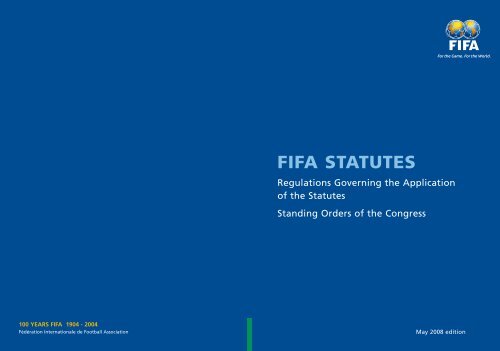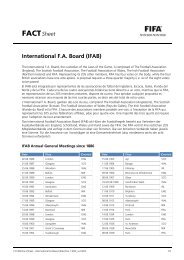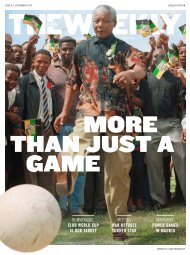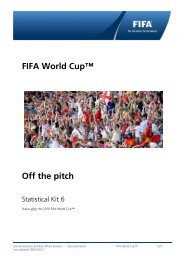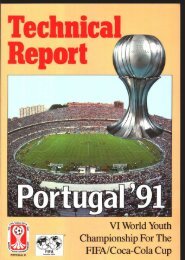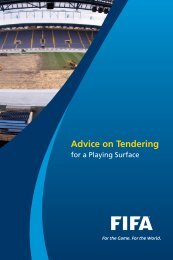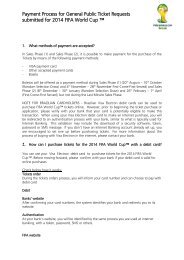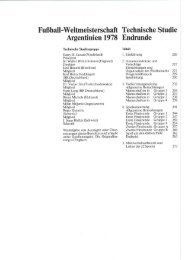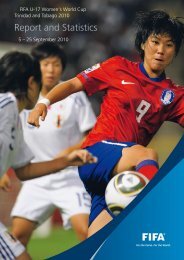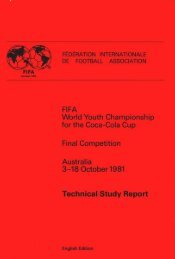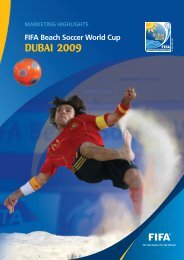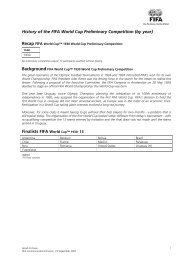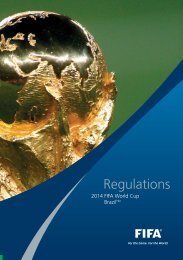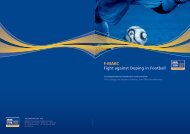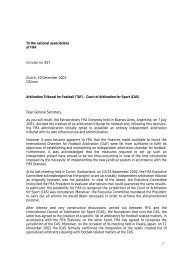FIFA STATUTES - FIFA.com
FIFA STATUTES - FIFA.com
FIFA STATUTES - FIFA.com
Create successful ePaper yourself
Turn your PDF publications into a flip-book with our unique Google optimized e-Paper software.
100 YEARS <strong>FIFA</strong> 1904 - 2004<br />
Fédération Internationale de Football Association<br />
<strong>FIFA</strong> <strong>STATUTES</strong><br />
Regulations Governing the Application<br />
of the Statutes<br />
Standing Orders of the Congress<br />
May 2008 edition
Fédération Internationale de Football Association<br />
President: Joseph S. Blatter<br />
Secretary General: Jérôme Valcke<br />
Address: <strong>FIFA</strong><br />
<strong>FIFA</strong>-Strasse 20<br />
P.O. Box<br />
CH-8044 Zurich<br />
Switzerland<br />
Telephone: +41-(0)43-222 7777<br />
Telefax: +41-(0)43-222 7878<br />
Internet: www.<strong>FIFA</strong>.<strong>com</strong>
<strong>FIFA</strong> Statutes<br />
Regulations Governing the Application<br />
of the Statutes<br />
Standing Orders of the Congress<br />
2008
INDEX<br />
Index article page<br />
Definitions 4<br />
I. General provisions 1-8 5-7<br />
II. Membership 9-18 8-14<br />
III. Honorary president, honorary vice-president<br />
and honorary member 19 15<br />
IV. Confederations 20 16-18<br />
V. Organisation 21-54 19-37<br />
A. Congress 22-29 20-25<br />
B. Executive Committee 30-31 26-28<br />
C. President 32 29<br />
D. Emergency Committee 33 30<br />
E. Standing <strong>com</strong>mittees 34-56 31-37<br />
VI. Disciplinary measures 57 38<br />
VII. Judicial bodies 58-61 39-40<br />
VIII. Arbitration 62-64 41-43<br />
IX. Submission to decisions of <strong>FIFA</strong> 65-66 44<br />
X. General secretariat 67-68 45<br />
XI. Finance 69-73 46-47<br />
XII. Rights in <strong>com</strong>petitions and events 74-75 48<br />
XIII. Competitions 76-80 49-51<br />
A. <strong>FIFA</strong> final <strong>com</strong>petitions 76 49<br />
B. International matches and <strong>com</strong>petitions 77-80 50-51<br />
XIV. Final provisions 81-83 52
Index article page<br />
Regulations Governing the Application of the Statutes<br />
I. Application for admission to <strong>FIFA</strong> 1-2 53<br />
II. Definition, notification and registration of matches 3-7 54-56<br />
III. Interclub and interleague matches 8 57<br />
IV. Tournaments 9 58<br />
V. Financial arrangements 10-12 59-60<br />
VI. Match and players’ agents 13-14 61<br />
VII. Eligibility to play for representative teams 15-18 62-64<br />
VIII. Sporting integrity 19 65<br />
IX. Laws of the Game 20 66<br />
X. Referees and assistant referees 21-23 67-68<br />
XI. Final provisions 24-25 69<br />
Standing Orders of the <strong>FIFA</strong> Congress 1-11 70-76
DEFINITIONS<br />
4<br />
The terms given below denote the following:<br />
1 <strong>FIFA</strong>: “Fédération Internationale de Football Association”.<br />
2 Association: a football association recognised by <strong>FIFA</strong>. It is a member of<br />
<strong>FIFA</strong>, unless a different meaning is evident from the context.<br />
3 League: an organisation that is subordinate to an Association.<br />
4 British Associations: the four Associations in the United Kingdom – The<br />
Football Association, The Scottish Football Association, The Football<br />
Association of Wales and The Irish Football Association (Northern<br />
Ireland).<br />
5 IFAB: the International Football Association Board.<br />
6 Confederation: a group of Associations recognised by <strong>FIFA</strong> that belong to<br />
the same continent (or assimilable geographic region).<br />
7 Congress: the supreme and legislative body of <strong>FIFA</strong>.<br />
8 Executive Committee: the executive body of <strong>FIFA</strong>.<br />
9 Member: an Association that has been admitted into membership of<br />
<strong>FIFA</strong> by the Congress.<br />
10 Official: every board member, <strong>com</strong>mittee member, referee and assistant<br />
referee, coach, trainer and any other person responsible for technical,<br />
medical and administrative matters in <strong>FIFA</strong>, a Confederation, Association,<br />
League or club.<br />
11 Player: any football player licensed by an Association.<br />
12 Association Football: the game controlled by <strong>FIFA</strong> and organised in<br />
accordance with the Laws of the Game.<br />
13 Official <strong>com</strong>petition: a <strong>com</strong>petition for representative teams organised by<br />
<strong>FIFA</strong> or any Confederation.<br />
NB: Terms referring to natural persons are applicable to both genders. Any<br />
term in the singular applies to the plural and vice-versa.
I. GENERAL PROVISIONS<br />
Article 1 Name and headquarters<br />
1 <strong>FIFA</strong> is an association registered in the Commercial Register in<br />
accordance with art. 60 ff. of the Swiss Civil Code.<br />
2 <strong>FIFA</strong> headquarters are located in Zurich (Switzerland) and may<br />
only be transferred to another location following a resolution<br />
passed by the Congress.<br />
Article 2 Objectives<br />
The objectives of <strong>FIFA</strong> are:<br />
(a) to improve the game of football constantly and promote<br />
it globally in the light of its unifying, educational, cultural<br />
and humanitarian values, particularly through youth and<br />
development programmes;<br />
(b) to organise its own international <strong>com</strong>petitions;<br />
(c) to draw up regulations and provisions and ensure their<br />
enforcement;<br />
(d) to control every type of Association Football by taking<br />
appropriate steps to prevent infringements of the Statutes,<br />
regulations or decisions of <strong>FIFA</strong> or of the Laws of the Game;<br />
(e) to prevent all methods or practices which might jeopardise the<br />
integrity of matches or <strong>com</strong>petitions or give rise to abuse of<br />
Association Football.<br />
Article 3 Non-discrimination and stance against racism<br />
Discrimination of any kind against a country, private person or group<br />
of people on account of ethnic origin, gender, language, religion,<br />
politics or any other reason is strictly prohibited and punishable by<br />
suspension or expulsion.<br />
5
I. GENERAL PROVISIONS<br />
Article 4 Promoting friendly relations<br />
6<br />
1 <strong>FIFA</strong> shall promote friendly relations:<br />
(a) between Members, Confederations, clubs, Officials and Players.<br />
Every person and organisation involved in the game of football<br />
is obliged to observe the Statutes, regulations and the principles<br />
of fair play;<br />
(b) in society for humanitarian objectives.<br />
2 <strong>FIFA</strong> shall provide the necessary institutional means to resolve any<br />
dispute that may arise between Members, Confederations, clubs,<br />
Officials and Players.<br />
Article 5 Players<br />
The Executive Committee shall regulate the status of Players and the<br />
provisions for their transfer in special regulations.<br />
Article 6 Laws of the Game<br />
1 Each Member of <strong>FIFA</strong> shall play Association Football in <strong>com</strong>pliance<br />
with the Laws of the Game issued by IFAB. Only IFAB may lay down<br />
and alter the Laws of the Game.<br />
2 IFAB is <strong>com</strong>posed of eight members; four members are designated<br />
by <strong>FIFA</strong> and four by the British Associations.<br />
3 The duties and responsibilities of IFAB are contained in special<br />
regulations.<br />
4 Each Member of <strong>FIFA</strong> shall play futsal in accordance with the Futsal<br />
Laws of the Game, as issued by the <strong>FIFA</strong> Executive Committee.
Article 7 Conduct of bodies and officials<br />
The bodies and Officials must observe the Statutes, regulations,<br />
decisions and Code of Ethics of <strong>FIFA</strong> in their activities. The Executive<br />
Committee shall draw up the Code of Ethics.<br />
Article 8 Official languages<br />
1 English, Spanish, French and German are the official languages of<br />
<strong>FIFA</strong>. English is the official language for minutes, correspondence<br />
and announcements.<br />
2 Members are responsible for translations into the language of their<br />
country.<br />
3 English, Spanish, French, German, Russian, Arabic and Portuguese<br />
are the official languages at the Congress. Qualified interpreters<br />
shall translate into these languages. Delegates may speak in their<br />
mother tongue if they ensure interpretation into one of the official<br />
Congress languages by a qualified interpreter.<br />
4 The Statutes, Regulations Governing the Application of the Statutes,<br />
the Standing Orders of the Congress, decisions and announcements<br />
of <strong>FIFA</strong> shall be published in the four official languages. If there is<br />
any divergence in the wording, the English text is authoritative.<br />
7
II. MEMBERSHIP<br />
Article 9 Admission, suspension and expulsion<br />
Article 10 Admission<br />
8<br />
The Congress shall decide whether to admit, suspend or expel a<br />
Member.<br />
1 Any Association which is responsible for organising and supervising<br />
football in its country may be<strong>com</strong>e a Member of <strong>FIFA</strong>. In this<br />
context, the expression “country” shall refer to an independent state<br />
recognised by the international <strong>com</strong>munity. Subject to par. 5 and par.<br />
6 below, only one Association shall be recognised in each country.<br />
2 Membership is only permitted if an Association has already been a<br />
provisional member of a Confederation for at least two years.<br />
3 Any Association wishing to be<strong>com</strong>e a Member of <strong>FIFA</strong> shall apply in<br />
writing to the <strong>FIFA</strong> general secretariat.<br />
4 The Association’s legally valid statutes shall be enclosed with the<br />
application for membership and shall contain the following<br />
mandatory provisions:<br />
(a) always to <strong>com</strong>ply with the Statutes, regulations and decisions of<br />
<strong>FIFA</strong> and of its Confederation;<br />
(b) to <strong>com</strong>ply with the Laws of the Game in force;<br />
(c) to recognise the Court of Arbitration for Sport, as specified in<br />
these Statutes.
5 Each of the four British Associations is recognised as a separate<br />
Member of <strong>FIFA</strong>.<br />
6 An Association in a region which has not yet gained independence<br />
may, with the authorisation of the Association in the country on<br />
which it is dependent, also apply for admission to <strong>FIFA</strong>.<br />
7 The Regulations Governing the Application of the Statutes shall<br />
regulate the details of the procedure for admission.<br />
8 This article shall not affect the status of existing Members.<br />
9
II. MEMBERSHIP<br />
Article 11 Request and procedure for application<br />
1 The Executive Committee shall request the Congress either to<br />
admit or not to admit an Association. The Association may state<br />
the reasons for its application to the Congress.<br />
2 The new Member shall acquire membership rights and duties as<br />
soon as it has been admitted. Its delegates are eligible to vote and<br />
be elected with immediate effect.<br />
Article 12 Members’ rights<br />
10<br />
1 Members have the following rights:<br />
(a) to take part in the Congress;<br />
(b) to draw up proposals for inclusion in the agenda of the Congress;<br />
(c) to nominate candidates for the <strong>FIFA</strong> presidency;<br />
(d) to take part in <strong>com</strong>petitions organised by <strong>FIFA</strong>;<br />
(e) to take part in <strong>FIFA</strong>’s assistance and development programmes;<br />
(f) to exercise all other rights arising from these Statutes and<br />
other regulations.<br />
2 The exercise of these rights is subject to other provisions in these<br />
Statutes and the applicable regulations.
Article 13 Members’ obligations<br />
1 Members have the following obligations:<br />
(a) to <strong>com</strong>ply fully with the Statutes, regulations, directives and<br />
decisions of <strong>FIFA</strong> bodies at any time as well as the decisions of<br />
the Court of Arbitration for Sport (CAS) passed on appeal on<br />
the basis of art. 60 par. 1 of the <strong>FIFA</strong> Statutes;<br />
(b) to take part in <strong>com</strong>petitions organised by <strong>FIFA</strong>;<br />
(c) to pay their membership subscriptions;<br />
(d) to ensure that their own members <strong>com</strong>ply with the Statutes,<br />
regulations, directives and decisions of <strong>FIFA</strong> bodies;<br />
(e) to create a Referees Committee that is directly subordinate to<br />
the Member;<br />
(f) to respect the Laws of the Game;<br />
(g) to <strong>com</strong>ply fully with all other duties arising from these Statutes<br />
and other regulations.<br />
2 Violation of the above-mentioned obligations by any Member may<br />
lead to sanctions provided for in these Statutes.<br />
11
II. MEMBERSHIP<br />
Article 14 Suspension<br />
1 The Congress is responsible for suspending a Member. The Executive<br />
Committee may, however, suspend a Member that seriously and<br />
repeatedly violates its obligations as a Member with immediate<br />
effect. The suspension shall last until the next Congress, unless the<br />
Executive Committee has lifted it in the meantime.<br />
2 A suspension shall be confirmed at the next Congress by a threequarter<br />
majority of the votes taken. If it is not confirmed, the<br />
suspension is automatically lifted.<br />
3 A suspended Member shall lose its membership rights. Other<br />
Members may not entertain sporting contact with a suspended<br />
Member. The Disciplinary Committee may impose further sanctions.<br />
4 Members which do not participate in at least two of all <strong>FIFA</strong><br />
<strong>com</strong>petitions over a period of four consecutive years shall be<br />
suspended from voting at the Congress until they have fulfilled their<br />
obligations in this respect.<br />
Article 15 Expulsion<br />
12<br />
1 The Congress may expel a Member:<br />
(a) if it fails to fulfil its financial obligations towards <strong>FIFA</strong>; or<br />
(b) if it seriously violates the Statutes, regulations, decisions or the<br />
Code of Ethics of <strong>FIFA</strong>; or<br />
(c) if it loses the status of an Association representing Association<br />
Football in its country.<br />
2 The presence of an absolute majority of Members entitled to vote at<br />
the Congress is necessary for an expulsion to be valid, and the<br />
motion for expulsion must be adopted by a three-quarter majority<br />
of the votes taken.
Article 16 Resignation<br />
1 A Member may resign from <strong>FIFA</strong> with effect from the end of a<br />
calendar year. Notice of resignation must reach the general<br />
secretariat no later than six months before the end of the calendar<br />
year and be sent by registered letter.<br />
2 The resignation is not valid until the Member wishing to resign has<br />
fulfilled its financial obligations towards <strong>FIFA</strong> and its other<br />
Members.<br />
Article 17 Bodies<br />
1 A Member’s bodies shall be either elected or appointed in<br />
that Association. A Member’s statutes shall provide for a procedure<br />
that guarantees the <strong>com</strong>plete independence of the election or<br />
appointment.<br />
2 Any Member’s bodies that have not been elected or appointed in<br />
<strong>com</strong>pliance with the provisions of par. 1, even on an interim basis,<br />
shall not be recognised by <strong>FIFA</strong>.<br />
3 Decisions passed by bodies that have not been elected or appointed<br />
in <strong>com</strong>pliance with par. 1 shall not be recognised by <strong>FIFA</strong>.<br />
13
II. MEMBERSHIP<br />
Article 18 Status of Leagues and other groups of clubs<br />
14<br />
1 Leagues or any other groups affiliated to a Member of <strong>FIFA</strong> shall be<br />
subordinate to and recognised by that Member. The Member’s<br />
statutes shall define the scope of authority and the rights and<br />
duties of these groups. The statutes and regulations of these groups<br />
shall be approved by the Member.<br />
2 Every Member shall ensure that its affiliated clubs can take all<br />
decisions on any matters regarding membership independently of<br />
any external body. This obligation applies regardless of an affiliated<br />
club’s corporate structure. In any case, the Member shall ensure<br />
that neither a natural nor a legal person (including holding<br />
<strong>com</strong>panies and subsidiaries) exercises control over more than one<br />
club whenever the integrity of any match or <strong>com</strong>petition could be<br />
jeopardised.
III. HONORARY PRESIDENT, HONORARY VICE-PRESIDENT<br />
AND HONORARY MEMBER<br />
Article 19 Honorary president, honorary vice-president and<br />
honorary member<br />
1 The Congress may bestow the title of honorary president, honorary<br />
vice-president or honorary member upon any former member of the<br />
<strong>FIFA</strong> Executive Committee for meritorious service to football.<br />
2 The Executive Committee shall make these nominations.<br />
3 The honorary president, honorary vice-president or honorary member<br />
may take part in the Congress. They may join in the debates but may<br />
not vote.<br />
15
IV. CONFEDERATIONS<br />
Article 20 Confederations<br />
16<br />
1 Members that belong to the same continent have formed the<br />
following Confederations, which are recognised by <strong>FIFA</strong>:<br />
(a) Confederación Sudamericana de Fútbol – CONMEBOL<br />
(b) Asian Football Confederation – AFC<br />
(c) Union des associations européennes de football – UEFA<br />
(d) Confédération Africaine de Football – CAF<br />
(e) Confederation of North, Central American and Caribbean<br />
Association Football – CONCACAF<br />
(f) Oceania Football Confederation – OFC<br />
2 <strong>FIFA</strong> may, in exceptional circumstances, authorise a Confederation<br />
to grant membership to an Association that belongs geographically<br />
to another continent and is not affiliated to the Confederation on<br />
that continent. The opinion of the Confederation concerned<br />
geographically shall be obtained.<br />
3 Each Confederation shall have the following rights and obligations:<br />
(a) to <strong>com</strong>ply with and enforce <strong>com</strong>pliance with the Statutes,<br />
regulations and decisions of <strong>FIFA</strong>;<br />
(b) to work closely with <strong>FIFA</strong> in every domain so as to achieve the<br />
objectives stipulated in art. 2 and to organise international<br />
<strong>com</strong>petitions;<br />
(c) to organise its own interclub <strong>com</strong>petitions, in <strong>com</strong>pliance with<br />
the international match calendar;
(d) to organise its own international <strong>com</strong>petitions, particularly<br />
youth <strong>com</strong>petitions, in <strong>com</strong>pliance with the international match<br />
calendar;<br />
(e) to ensure that international Leagues or any other such groups<br />
of clubs or Leagues shall not be formed without its consent and<br />
the approval of <strong>FIFA</strong>;<br />
(f) at the request of <strong>FIFA</strong>, to grant Associations applying for<br />
membership the status of a provisional member. This status<br />
shall grant Associations the right to take part in the<br />
Confederation’s <strong>com</strong>petitions and conferences.<br />
Any other rights and obligations of the provisional member shall<br />
be regulated by the Confederation’s statutes and regulations.<br />
Provisional members may not take part in <strong>FIFA</strong> final<br />
<strong>com</strong>petitions;<br />
(g) to appoint to the Executive Committee members to which they<br />
are entitled in <strong>com</strong>pliance with these Statutes;<br />
(h) to nurture relations and cooperation with <strong>FIFA</strong> actively and<br />
constructively for the good of the game through consultative<br />
meetings and to discuss and resolve any problems relating to the<br />
interests of the Confederations and <strong>FIFA</strong>;<br />
(i) to ensure that the representatives appointed to <strong>FIFA</strong> bodies<br />
or the Executive Committee carry out their activities on these<br />
bodies with mutual respect, solidarity, recognition and fair play;<br />
(j) to set up <strong>com</strong>mittees that work closely together with the<br />
corresponding <strong>com</strong>mittees at <strong>FIFA</strong>;<br />
(k) exceptionally to allow, with <strong>FIFA</strong>’s consent, an Association from<br />
another Confederation (or clubs belonging to that Association)<br />
to participate in a <strong>com</strong>petition that it is organising;<br />
(l) with the mutual cooperation of <strong>FIFA</strong>, to take any action<br />
considered necessary to develop the game of football on the<br />
continent concerned, such as arranging development<br />
programmes, courses, conferences etc.;<br />
17
IV. CONFEDERATIONS<br />
18<br />
(m)to set up the bodies necessary to fulfil the duties incumbent<br />
upon it;<br />
(n) to procure the funds necessary to fulfil its duties.<br />
4 The Executive Committee may delegate other duties or powers to<br />
the Confederations. To this end, <strong>FIFA</strong> may conclude an appropriate<br />
agreement with each of the Confederations concerned.<br />
5 The Confederations’ statutes and regulations shall be submitted to<br />
<strong>FIFA</strong> for approval.
V. ORGANISATION<br />
Article 21 Bodies<br />
1 The Congress is the supreme and legislative body.<br />
2 The Executive Committee is the executive body.<br />
3 The general secretariat is the administrative body.<br />
4 Standing and ad-hoc <strong>com</strong>mittees shall advise and assist the<br />
Executive Committee in fulfilling its duties. Their primary duties are<br />
defined in these Statutes and their <strong>com</strong>position, function and<br />
additional duties are defined in special regulations.<br />
19
V. ORGANISATION<br />
Article 22 Congress<br />
20<br />
A. CONGRESS<br />
1 A Congress may be an Ordinary or an Extraordinary Congress.<br />
2 The Ordinary Congress shall be held every year. The Executive<br />
Committee shall fix the place and date. The Members shall be notified<br />
in writing at least three months in advance. The formal convocation<br />
shall be made in writing at least one month before the date of the<br />
Congress. This convocation shall contain the agenda, the President’s<br />
report, the financial statements and the auditors’ report.<br />
3 The Executive Committee may convene an Extraordinary Congress at<br />
any time.<br />
4 The Executive Committee shall convene an Extraordinary Congress<br />
if one-fifth of the Members make such a request in writing. The<br />
request shall specify the items for the agenda. An Extraordinary<br />
Congress shall be held within three months of receipt of the request.<br />
5 The Members shall be notified of the place, date and agenda at least<br />
two months before the date of an Extraordinary Congress. The<br />
agenda of an Extraordinary Congress may not be altered.
Article 23 Vote, delegates, observers<br />
1 Each Member has one vote in the Congress and is represented by its<br />
delegates. Only the Members present are entitled to vote. Voting by<br />
proxy or by letter is not permitted.<br />
2 Delegates must belong to the Member Association that they represent<br />
and be appointed by the appropriate body of that Association.<br />
3 Confederation delegates may take part in the Congress as observers.<br />
4 During their term of office, members of the Executive Committee<br />
may not be appointed as delegates for their Association.<br />
5 The President shall conduct the Congress business in <strong>com</strong>pliance<br />
with the Standing Orders of the Congress.<br />
Article 24 Candidates for the office of <strong>FIFA</strong> President<br />
1 Only Members may propose candidates for the office of <strong>FIFA</strong><br />
President. Members shall notify the <strong>FIFA</strong> general secretariat in<br />
writing of the name of a candidate for the <strong>FIFA</strong> presidency at least<br />
two months before the date of the Congress.<br />
2 The general secretariat shall notify the Members of the names of<br />
proposed candidates at least one month before the date of the<br />
Congress.<br />
21
V. ORGANISATION<br />
Article 25 Ordinary Congress agenda<br />
22<br />
A. CONGRESS<br />
1 The Secretary General shall draw up the agenda based on proposals<br />
from the Executive Committee and the Members. Any proposal that<br />
a Member wishes to submit to the Congress shall be sent to the<br />
general secretariat in writing, with a brief explanation, at least two<br />
months before the date of the Congress.<br />
2 The Congress agenda shall include the following mandatory items:<br />
(a) a declaration that the Congress has been convened and<br />
<strong>com</strong>posed in <strong>com</strong>pliance with the Statutes;<br />
(b) approval of the agenda;<br />
(c) an address by the President;<br />
(d) appointment of five Members to check the minutes;<br />
(e) appointment of scrutineers;<br />
(f) suspension or expulsion of a Member (if applicable);<br />
(g) approval of the minutes of the preceding Congress;<br />
(h) activity report (containing the activities since the last Congress);<br />
(i) presentation of the consolidated and revised balance sheet and<br />
the profit and loss statement;<br />
(j) approval of the financial statements;<br />
(k) approval of the budget;<br />
(l) admission for membership (if applicable);<br />
(m)votes on proposals for amendments to the Statutes, the<br />
Regulations Governing the Application of the Statutes and the<br />
Standing Orders of the Congress (if applicable);<br />
(n) discussion of proposals submitted by the Members and the<br />
Executive Committee within the period stipulated under par. 1<br />
(if applicable);
(o) appointment of auditors (if applicable);<br />
(p) election of the President and installation of the vice-presidents<br />
and members of the Executive Committee (if applicable).<br />
3 The agenda of an Ordinary Congress may be altered, provided threequarters<br />
of the Members present at the Congress and eligible to<br />
vote agree to such a motion.<br />
Article 26 Amendments to the Statutes, Regulations Governing<br />
the Application of the Statutes and the Standing Orders<br />
of the Congress<br />
1 The Congress is responsible for amending the Statutes, the<br />
Regulations Governing the Application of the Statutes and the<br />
Standing Orders of the Congress.<br />
2 Any proposals for an amendment to the Statutes must be submitted<br />
in writing with a brief explanation to the general secretariat by a<br />
Member or by the Executive Committee. A proposal submitted by a<br />
Member is valid, provided it has been supported in writing by at<br />
least two other Members.<br />
3 For a vote on an amendment to the Statutes to be valid, an absolute<br />
majority (half of the Members plus one Member) of the Members<br />
eligible to vote must be present.<br />
4 A proposal for an amendment to the Statutes shall be adopted<br />
only if three-quarters of the Members present and eligible to vote<br />
agree to it.<br />
5 Any proposal to amend the Regulations Governing the Application<br />
of the Statutes and the Standing Orders of the Congress must<br />
be submitted in writing with a brief explanation to the general<br />
secretariat by a Member or by the Executive Committee.<br />
6 A proposal for an amendment to the Regulations Governing the<br />
Application of the Statutes and the Standing Orders of the Congress<br />
shall be adopted only if a simple majority of the Members present<br />
and eligible to vote agree to it.<br />
23
V. ORGANISATION<br />
Article 27 Elections, other decisions, requisite majority<br />
24<br />
A. CONGRESS<br />
1 Elections shall be conducted by secret ballot.<br />
2 Any other decision that requires a vote shall be reached by a show<br />
of hands or by means of an electronic count. If a show of hands does<br />
not result in a clear majority in favour of a motion, the vote shall<br />
be taken by calling the roll, members being called in English<br />
alphabetical order.<br />
3 For the election of the President, two-thirds of the votes recorded<br />
and valid are necessary in the first ballot. In the second and any<br />
other requisite ballot, an absolute majority of the votes recorded is<br />
sufficient. If there are more than two candidates, whoever obtains<br />
the lowest number of votes is eliminated as from the second ballot<br />
until only two candidates are left.<br />
4 Unless otherwise stipulated in the Statutes, a simple majority is<br />
sufficient for a vote to be valid. The number of valid votes counted<br />
shall decide the simple majority. Abstentions are disregarded in<br />
calculating the majority.
Article 28 Minutes<br />
1 The Secretary General shall be responsible for recording the minutes<br />
at the Congress.<br />
2 The minutes of the Congress shall be checked by those Members<br />
designated.<br />
Article 29 Effective dates of decisions<br />
Decisions passed by the Congress shall <strong>com</strong>e into effect for the<br />
Members sixty days after the close of the Congress, unless the<br />
Congress fixes another date for a decision to take effect.<br />
25
V. ORGANISATION<br />
Article 30 Composition, election of President, vice-presidents and members<br />
26<br />
B. EXECUTIVE COMMITTEE<br />
1 The Executive Committee consists of 24 members:<br />
1 President, elected by the Congress<br />
8 vice-presidents, and<br />
15 members, appointed by the Confederations and Associations.<br />
2 The President shall be elected by the Congress for a period of four<br />
years in the year following a <strong>FIFA</strong> World Cup. His mandate shall<br />
begin after the end of the Congress which has elected him. A<br />
President may be re-elected.<br />
3 The members of the Executive Committee shall be appointed by the<br />
respective Confederations, with the exception of the vice-president<br />
representing the four British Associations, who is elected by the<br />
latter. All Confederations and the four British Associations shall pass<br />
a single decision as to when they wish to appoint or elect their<br />
member(s) to the <strong>FIFA</strong> Executive Committee. The subsequent<br />
Congresses of the Confederations and the four British Associations<br />
shall take this decision within one year of these Statutes <strong>com</strong>ing<br />
into force. When making the appointments, a Confederation may<br />
appoint or reappoint only half of its members (in the case of odd<br />
numbers, half of the appointments plus or minus one), and only<br />
every two years. The Executive Committee members’ mandates shall<br />
last for four years, starting upon their installation by the <strong>FIFA</strong><br />
Congress. If a Confederation or the four British Associations decide<br />
to change the year for making appointments or holding an election<br />
in its statutes, the mandate of the vice-president and members<br />
appointed to the <strong>FIFA</strong> Executive Committee will be extended by one<br />
year, but only once.<br />
An installed member of the Executive Committee may only be<br />
removed from office by the <strong>FIFA</strong> Congress.
The Confederations are apportioned the following places:<br />
(a) CONMEBOL vice-president (1) members (2)<br />
(b) AFC vice-president (1) members (3)<br />
(c) UEFA vice-presidents (2) members (5)<br />
(d) CAF vice-president (1) members (3)<br />
(e) CONCACAF vice-president (1) members (2)<br />
(f) OFC vice-president (1) member (–)<br />
(g) the four British<br />
Associations vice-president (1) member (–)<br />
4 Not more than one member from the same Association may serve<br />
on the Executive Committee simultaneously.<br />
5 The mandate of vice-presidents and members is for four years. They<br />
may be re-elected.<br />
6 If the President is permanently or temporarily prevented from<br />
performing his official function, the longest serving vice-president<br />
shall represent him until the next Congress. This Congress shall<br />
elect a new President, if necessary.<br />
7 Any member of the Executive Committee who no longer exercises<br />
his official function shall be immediately replaced by the<br />
Confederation or Associations which appointed him for the<br />
remaining period of office.<br />
27
V. ORGANISATION<br />
Article 31 Powers of the Executive Committee<br />
28<br />
B. EXECUTIVE COMMITTEE<br />
1 The Executive Committee shall pass decisions on all cases that do<br />
not <strong>com</strong>e within the sphere of responsibility of the Congress or are<br />
not reserved for other bodies by law or under these Statutes.<br />
2 The Executive Committee shall meet at least twice a year.<br />
3 The President shall convene the Executive Committee meetings. If<br />
at least thirteen members of the Executive Committee request a<br />
meeting, the President shall convene it.<br />
4 The Executive Committee shall appoint the chairmen, deputy<br />
chairmen and members of the standing <strong>com</strong>mittees.<br />
5 The Executive Committee shall appoint the chairmen, deputy<br />
chairmen and members of the judicial bodies.<br />
6 The President shall <strong>com</strong>pile the agenda. Each member of the<br />
Executive Committee is entitled to propose items for inclusion in<br />
the agenda.<br />
7 The Executive Committee may decide to set up ad-hoc <strong>com</strong>mittees<br />
if necessary at any time.<br />
8 The Executive Committee shall appoint the delegates from <strong>FIFA</strong> to<br />
IFAB.<br />
9 The Executive Committee shall <strong>com</strong>pile the regulations for the<br />
organisation of standing <strong>com</strong>mittees and ad-hoc <strong>com</strong>mittees.<br />
10 The Executive Committee shall appoint or dismiss the Secretary<br />
General on the proposal of the President. The Secretary General<br />
shall attend the meetings of all the <strong>com</strong>mittees ex officio.<br />
11 The Executive Committee shall decide the place and dates of the<br />
final <strong>com</strong>petitions of <strong>FIFA</strong> tournaments and the number of teams<br />
taking part from each Confederation.<br />
12 The Executive Committee shall approve regulations stipulating how<br />
<strong>FIFA</strong> shall be organised internally.
V. ORGANISATION<br />
C. PRESIDENT<br />
Article 32 President<br />
1 The President represents <strong>FIFA</strong> legally.<br />
2 He is primarily responsible for:<br />
(a) implementing the decisions passed by the Congress and the<br />
Executive Committee through the general secretariat;<br />
(b) supervising the work of the general secretariat;<br />
(c) relations between <strong>FIFA</strong> and the Confederations, Members,<br />
political bodies and international organisations.<br />
3 Only the President may propose the appointment or dismissal of the<br />
Secretary General.<br />
4 The President shall preside over the Congress, the Executive and<br />
Emergency Committee meetings and those <strong>com</strong>mittees of which he<br />
has been appointed chairman.<br />
5 The President shall have an ordinary vote on the Executive<br />
Committee and, whenever votes are equal, shall have a casting vote.<br />
6 If the President is absent or unavailable, the longest serving vicepresident<br />
available shall deputise.<br />
7 Any additional powers of the President shall be contained in the<br />
internal organisation regulations of <strong>FIFA</strong>.<br />
29
V. ORGANISATION<br />
Article 33 Emergency Committee<br />
30<br />
D. EMERGENCY COMMITTEE<br />
1 The Emergency Committee shall deal with all matters requiring<br />
immediate settlement between two meetings of the Executive<br />
Committee. The <strong>com</strong>mittee shall consist of the <strong>FIFA</strong> President and<br />
one member from each Confederation appointed by the Executive<br />
Committee and chosen from among its members for a period of<br />
four years.<br />
2 The President shall convene the Emergency Committee meetings. If<br />
a meeting cannot be convened within an appropriate period of time,<br />
decisions may be passed through other means of <strong>com</strong>munication.<br />
Such decisions shall have immediate legal effect. The President<br />
shall notify the Executive Committee immediately of the decisions<br />
passed by the Emergency Committee.<br />
3 All decisions taken by the Emergency Committee shall be ratified by<br />
the Executive Committee at its next meeting.<br />
4 If the President is unable to attend a meeting, the longest serving<br />
vice-president available shall deputise.<br />
5 The President is entitled to designate a deputy for any member who<br />
is unable to attend or has a conflict of interests. The deputy shall<br />
belong to the Executive Committee and the same Confederation as<br />
the member who is unable to attend or has a conflict of interests.
V. ORGANISATION<br />
E. STANDING COMMITTEES<br />
Article 34 Standing <strong>com</strong>mittees<br />
1 The standing <strong>com</strong>mittees are:<br />
(a) Finance Committee<br />
(b) Internal Audit Committee<br />
(c) Organising Committee for the <strong>FIFA</strong> World Cup<br />
(d) Organising Committee for the <strong>FIFA</strong> Confederations Cup<br />
(e) Organising Committee for the Olympic Football Tournaments<br />
(f) Organising Committee for the <strong>FIFA</strong> U-20 World Cup<br />
(g) Organising Committee for the <strong>FIFA</strong> U-17 World Cup<br />
(h) Committee for Women’s Football and<br />
the <strong>FIFA</strong> Women’s World Cup<br />
(i) Organising Committee for the <strong>FIFA</strong> U-20 and<br />
U-17 Women’s World Cups<br />
(j) Futsal and Beach Soccer Committee<br />
(k) Committee for Club Football<br />
(l) Referees Committee<br />
(m)Technical and Development Committee<br />
(n) Medical Committee<br />
(o) Players’ Status Committee<br />
(p) Legal Committee<br />
(q) Committee for Fair Play and Social Responsibility<br />
(r) Media Committee<br />
(s) Associations Committee<br />
(t) Football Committee<br />
(u) Strategic Committee<br />
(v) Marketing and Television Advisory Board<br />
31
V. ORGANISATION<br />
32<br />
E. STANDING COMMITTEES<br />
2 The chairmen and deputy chairmen of the standing <strong>com</strong>mittees<br />
shall be members of the Executive Committee with the exception of<br />
those for the Internal Audit Committee, who may not belong to the<br />
Executive Committee.<br />
3 The members of each standing <strong>com</strong>mittee shall be designated by the<br />
Executive Committee on the proposal of the Members of <strong>FIFA</strong>, the<br />
President of <strong>FIFA</strong> or the Confederations.<br />
The chairmen, deputy chairmen and the members of the standing<br />
<strong>com</strong>mittees shall be designated for a term of office of four years.<br />
4 The <strong>com</strong>position, specific duties and powers of the individual<br />
<strong>com</strong>mittees shall be stipulated in special organisation regulations.<br />
5 Each chairman shall represent his <strong>com</strong>mittee and conduct business<br />
in <strong>com</strong>pliance with the relevant organisation regulations.<br />
6 Each <strong>com</strong>mittee may, if necessary, set up a bureau and/or sub<strong>com</strong>mittee<br />
to settle urgent matters.<br />
7 Each <strong>com</strong>mittee may propose amendments to its regulations to the<br />
Executive Committee.
Article 35 Finance Committee<br />
The Finance Committee shall monitor the financial management<br />
and advise the Executive Committee on financial matters and asset<br />
management. It shall analyse the <strong>FIFA</strong> budget and the financial<br />
statements prepared by the Secretary General and submit them to<br />
the Executive Committee for approval.<br />
Article 36 Internal Audit Committee<br />
The Internal Audit Committee shall ensure the <strong>com</strong>pleteness and<br />
reliability of the financial accounting and review the external<br />
auditors’ report at the request of the Executive Committee.<br />
Article 37 Organising Committee for the <strong>FIFA</strong> World Cup<br />
The Organising Committee for the <strong>FIFA</strong> World Cup shall organise<br />
the <strong>FIFA</strong> World Cup in <strong>com</strong>pliance with the provisions of the<br />
regulations applicable to this <strong>com</strong>petition, the List of Requirements<br />
and the Organising Association Agreement.<br />
Article 38 Organising Committee for the <strong>FIFA</strong> Confederations Cup<br />
The Organising Committee for the <strong>FIFA</strong> Confederations Cup shall<br />
organise the <strong>FIFA</strong> Confederations Cup in <strong>com</strong>pliance with the<br />
provisions of the regulations applicable to this <strong>com</strong>petition, the<br />
List of Requirements and the Organising Association Agreement.<br />
Article 39 Organising Committee for the Olympic Football Tournaments<br />
The Organising Committee for the Olympic Football Tournaments<br />
shall organise the Olympic Football Tournaments in <strong>com</strong>pliance<br />
with the provisions of the regulations applicable to these<br />
tournaments and the Olympic Charter.<br />
33
V. ORGANISATION<br />
Article 40 Organising Committee for the <strong>FIFA</strong> U-20 World Cup<br />
The Organising Committee for the <strong>FIFA</strong> U-20 World Cup shall<br />
organise the <strong>FIFA</strong> U-20 World Cup in <strong>com</strong>pliance with the provisions<br />
of the regulations applicable to this <strong>com</strong>petition, the List of<br />
Requirements and the Organising Association Agreement.<br />
Article 41 Organising Committee for the <strong>FIFA</strong> U-17 World Cup<br />
The Organising Committee for the <strong>FIFA</strong> U-17 World Cup shall<br />
organise the <strong>FIFA</strong> U-17 World Cup in <strong>com</strong>pliance with the provisions<br />
of the regulations applicable to this <strong>com</strong>petition, the List of<br />
Requirements and the Organising Association Agreement.<br />
Article 42 Committee for Women’s Football and<br />
the <strong>FIFA</strong> Women’s World Cup<br />
The Committee for Women’s Football and the <strong>FIFA</strong> Women’s World<br />
Cup shall organise the <strong>FIFA</strong> Women’s World Cup in <strong>com</strong>pliance<br />
with the provisions of the regulations applicable to this <strong>com</strong>petition,<br />
the List of Requirements and the Organising Association Agreement<br />
and deal with general issues relating to women’s football.<br />
Article 43 Organising Committee for the <strong>FIFA</strong> U-20 and<br />
U-17 Women’s World Cups<br />
34<br />
E. STANDING COMMITTEES<br />
The Organising Committee for the <strong>FIFA</strong> U-20 and U-17 Women’s<br />
World Cups shall organise the <strong>FIFA</strong> U-20 and U-17 Women’s<br />
World Cups in <strong>com</strong>pliance with the provisions of the regulations<br />
applicable to each <strong>com</strong>petition, the Lists of Requirements and the<br />
Organising Association Agreements.
Article 44 Futsal and Beach Soccer Committee<br />
The Futsal and Beach Soccer Committee shall organise the <strong>FIFA</strong> Futsal<br />
World Cup and the <strong>FIFA</strong> Beach Soccer World Cup in <strong>com</strong>pliance with<br />
the provisions of the regulations applicable to each <strong>com</strong>petition, the<br />
Lists of Requirements and the Organising Association Agreements,<br />
draw up the Futsal Laws of the Game and the Beach Soccer Laws of<br />
the Game and deal with general issues relating to futsal and beach<br />
soccer.<br />
Article 45 Committee for Club Football<br />
The Committee for Club Football shall organise the <strong>FIFA</strong> Club World<br />
Cup in <strong>com</strong>pliance with the provisions of the regulations applicable<br />
to this <strong>com</strong>petition, the List of Requirements and the Organising<br />
Association Agreement and also consider issues relating to the<br />
interests of club football worldwide.<br />
Article 46 Referees Committee<br />
The Referees Committee shall implement and interpret the Laws of<br />
the Game and may propose amendments to the Laws of the Game<br />
to the Executive Committee. It shall appoint the referees and<br />
assistant referees for matches in <strong>com</strong>petitions organised by <strong>FIFA</strong>.<br />
Article 47 Technical and Development Committee<br />
The Technical and Development Committee shall primarily analyse<br />
the basic aspects of football training and technical development.<br />
35
V. ORGANISATION<br />
Article 48 Medical Committee<br />
The Medical Committee shall deal with all medical aspects of<br />
football.<br />
Article 49 Players’ Status Committee<br />
1 The Players’ Status Committee shall set up and monitor <strong>com</strong>pliance<br />
with the Regulations on the Status and Transfer of Players and<br />
determine the status of Players for various <strong>FIFA</strong> <strong>com</strong>petitions. Its<br />
powers of jurisdiction are governed by the Regulations on the Status<br />
and Transfer of Players.<br />
2 It shall also be responsible for the work of the Dispute Resolution<br />
Chamber in accordance with the Regulations on the Status and<br />
Transfer of Players and the Rules Governing the Procedures of the<br />
Players’ Status Committee and the Dispute Resolution Chamber.<br />
Article 50 Legal Committee<br />
The Legal Committee shall analyse basic legal issues relating to<br />
football and the evolution of the Statutes and regulations of <strong>FIFA</strong>,<br />
the Confederations and Members.<br />
Article 51 Committee for Fair Play and Social Responsibility<br />
36<br />
E. STANDING COMMITTEES<br />
The Committee for Fair Play and Social Responsibility shall deal<br />
with fair play matters in football worldwide, monitor adherence to<br />
fair play as well as support and supervise the conduct of everyone<br />
involved in football.
Article 52 Media Committee<br />
The Media Committee shall deal with the working conditions for the<br />
media at <strong>FIFA</strong> events and maintain relations with international<br />
media organisations.<br />
Article 53 Associations Committee<br />
The Associations Committee shall deal with relations between <strong>FIFA</strong><br />
and its Members and draw up proposals for optimum cooperation.<br />
The <strong>com</strong>mittee shall also monitor the evolution of the Statutes and<br />
regulations of <strong>FIFA</strong>, the Confederations and Members.<br />
Article 54 Football Committee<br />
The Football Committee shall deal with general issues in football<br />
but primarily with its structure as well as relations between clubs,<br />
Leagues, Members, Confederations and <strong>FIFA</strong>.<br />
Article 55 Strategic Committee<br />
The Strategic Committee shall deal with global strategies for<br />
football and its political, economic and social status.<br />
Article 56 Marketing and Television Advisory Board<br />
The Marketing and Television Advisory Board shall advise the<br />
Executive Committee with regard to drafting and implementing<br />
contracts between <strong>FIFA</strong> and its various marketing/television partners<br />
and analyse marketing and television strategies that have been<br />
devised.<br />
37
VI. DISCIPLINARY MEASURES<br />
Article 57 Disciplinary measures<br />
38<br />
The disciplinary measures are primarily:<br />
1 for natural and legal persons:<br />
(a) a warning;<br />
(b) a reprimand;<br />
(c) a fine;<br />
(d) the return of awards.<br />
2 for natural persons:<br />
(a) a caution;<br />
(b) an expulsion;<br />
(c) a match suspension;<br />
(d) a ban from the dressing rooms and/or the substitutes’ bench;<br />
(e) a ban from entering a stadium;<br />
(f) a ban on taking part in any football-related activity.<br />
3 for legal persons:<br />
(a) a transfer ban;<br />
(b) playing a match without spectators;<br />
(c) playing a match on neutral territory;<br />
(d) a ban on playing in a particular stadium;<br />
(e) annulment of the result of a match;<br />
(f) expulsion;<br />
(g) a forfeit;<br />
(h) deduction of points;<br />
(i) relegation to a lower division.<br />
4 The Executive Committee shall draw up the <strong>FIFA</strong> Disciplinary Code.
VII. JUDICIAL BODIES<br />
Article 58 Judicial bodies<br />
1 The judicial bodies of <strong>FIFA</strong> are:<br />
(a) the Disciplinary Committee;<br />
(b) the Appeal Committee;<br />
(c) the Ethics Committee.<br />
2 The responsibilities and function of these bodies shall be stipulated<br />
in the <strong>FIFA</strong> Disciplinary Code and the <strong>FIFA</strong> Code of Ethics.<br />
3 The decision-making powers of certain <strong>com</strong>mittees remain<br />
unaffected.<br />
Article 59 Disciplinary Committee<br />
1 The Disciplinary Committee shall consist of a chairman, deputy<br />
chairman and the number of members deemed necessary. The<br />
chairman and the deputy chairman shall have legal qualifications.<br />
2 The function of this body shall be governed by the <strong>FIFA</strong> Disciplinary<br />
Code. The <strong>com</strong>mittee shall pass decisions only when at least three<br />
members are present. In certain cases, the chairman may rule alone.<br />
3 The <strong>com</strong>mittee may pronounce the sanctions described in these<br />
Statutes and the <strong>FIFA</strong> Disciplinary Code on Members, clubs,<br />
Officials, Players and match and players’ agents.<br />
4 These provisions are subject to the disciplinary powers of the<br />
Congress and Executive Committee with regard to the suspension<br />
and expulsion of Members.<br />
39
VII. JUDICIAL BODIES<br />
Article 60 Appeal Committee<br />
1 The Appeal Committee shall consist of a chairman, deputy chairman<br />
and the number of members deemed necessary. The chairman and<br />
deputy chairman shall have legal qualifications.<br />
2 The function of this body shall be governed by the <strong>FIFA</strong> Disciplinary<br />
Code. The <strong>com</strong>mittee shall pass decisions only when at least three<br />
members are present. In certain cases, the chairman may rule alone.<br />
3 The Appeal Committee is responsible for hearing appeals against<br />
decisions from the Disciplinary Committee that are not declared<br />
final by the relevant <strong>FIFA</strong> regulations as well as decisions passed by<br />
the Players’ Status Committee concerning the eligibility of Players<br />
for representative teams.<br />
4 Decisions pronounced by the Appeal Committee shall be irrevocable<br />
and binding on all the parties concerned. This provision is subject to<br />
appeals lodged with the Court of Arbitration for Sport (CAS).<br />
Article 61 Ethics Committee<br />
40<br />
1 The Ethics Committee shall consist of a chairman, a deputy chairman<br />
and the number of members deemed necessary.<br />
2 The function of this body shall be governed by the <strong>FIFA</strong> Code of<br />
Ethics as established by the <strong>FIFA</strong> Executive Committee
VIII. ARBITRATION<br />
Article 62 Court of Arbitration for Sport (CAS)<br />
1 <strong>FIFA</strong> recognises the independent Court of Arbitration for Sport (CAS)<br />
with headquarters in Lausanne (Switzerland) to resolve disputes<br />
between <strong>FIFA</strong>, Members, Confederations, Leagues, clubs, Players,<br />
Officials and licensed match agents and players’ agents.<br />
2 The provisions of the CAS Code of Sports-Related Arbitration shall<br />
apply to the proceedings. CAS shall primarily apply the various<br />
regulations of <strong>FIFA</strong> and, additionally, Swiss law.<br />
Article 63 Jurisdiction of CAS<br />
1 Appeals against final decisions passed by <strong>FIFA</strong>’s legal bodies and<br />
against decisions passed by Confederations, Members or Leagues<br />
shall be lodged with CAS within 21 days of notification of the<br />
decision in question.<br />
2 Recourse may only be made to CAS after all other internal channels<br />
have been exhausted.<br />
3 CAS, however, does not deal with appeals arising from:<br />
(a) violations of the Laws of the Game;<br />
(b) suspensions of up to four matches or up to three months (with<br />
the exception of doping decisions);<br />
(c) decisions against which an appeal to an independent and duly<br />
constituted arbitration tribunal recognised under the rules of<br />
an Association or Confederation may be made.<br />
41
VIII. ARBITRATION<br />
42<br />
4 The appeal shall not have a suspensive effect. The appropriate<br />
<strong>FIFA</strong> body or, alternatively, CAS may order the appeal to have a<br />
suspensive effect.<br />
5 <strong>FIFA</strong> is entitled to appeal to CAS against any internally final and<br />
binding doping-related decision passed by the Confederations,<br />
Members or Leagues under the terms of par. 1 and par. 2 above.<br />
6 The World Anti-Doping Agency (WADA) is entitled to appeal to CAS<br />
against any internally final and binding doping-related decision<br />
passed by <strong>FIFA</strong>, the Confederations, Members or Leagues under the<br />
terms of par. 1 and par. 2 above.<br />
7 Any internally final and binding doping-related decision passed by the<br />
Confederations, Members or Leagues shall be sent immediately to<br />
<strong>FIFA</strong> and WADA by the body passing that decision. The time allowed<br />
for <strong>FIFA</strong> or WADA to lodge an appeal begins upon receipt by <strong>FIFA</strong> or<br />
WADA, respectively, of the internally final and binding decision in an<br />
official <strong>FIFA</strong> language.
Article 64 Obligation<br />
1 The Confederations, Members and Leagues shall agree to recognise<br />
CAS as an independent judicial authority and to ensure that their<br />
members, affiliated Players and Officials <strong>com</strong>ply with the decisions<br />
passed by CAS. The same obligation shall apply to licensed match<br />
and players’ agents.<br />
2 Recourse to ordinary courts of law is prohibited unless specifically<br />
provided for in the <strong>FIFA</strong> regulations.<br />
3 The Associations shall insert a clause in their statutes or regulations,<br />
stipulating that it is prohibited to take disputes in the Association or<br />
disputes affecting Leagues, members of Leagues, clubs, members of<br />
clubs, Players, Officials and other Association Officials to ordinary<br />
courts of law, unless the <strong>FIFA</strong> regulations or binding legal provisions<br />
specifically provide for or stipulate recourse to ordinary courts of<br />
law. Instead of recourse to ordinary courts of law, provision shall be<br />
made for arbitration. Such disputes shall be taken to an independent<br />
and duly constituted arbitration tribunal recognised under the rules<br />
of the Association or Confederation or to CAS.<br />
The Associations shall also ensure that this stipulation is<br />
implemented in the Association, if necessary by imposing a binding<br />
obligation on its members. The Associations shall impose sanctions<br />
on any party that fails to respect this obligation and ensure that any<br />
appeal against such sanctions shall likewise be strictly submitted to<br />
arbitration, and not to ordinary courts of law.<br />
43
IX. SUBMISSION TO DECISIONS OF <strong>FIFA</strong><br />
Article 65 Principle<br />
1 The Confederations, Members and Leagues shall agree to <strong>com</strong>ply<br />
fully with any decisions passed by the relevant <strong>FIFA</strong> bodies which,<br />
according to these Statutes, are final and not subject to appeal.<br />
2 They shall take every precaution necessary to ensure that their own<br />
members, Players and Officials <strong>com</strong>ply with these decisions.<br />
3 The same obligation applies to licensed match and players’ agents.<br />
Article 66 Sanctions<br />
44<br />
Any violation of the foregoing provisions will be punished in<br />
<strong>com</strong>pliance with the <strong>FIFA</strong> Disciplinary Code.
X. GENERAL SECRETARIAT<br />
Article 67 General secretariat<br />
The general secretariat shall carry out all the administrative work of<br />
<strong>FIFA</strong> under the direction of the Secretary General.<br />
Article 68 Secretary General<br />
1 The Secretary General is the chief executive of the general<br />
secretariat.<br />
2 He shall be appointed on the basis of an agreement governed by<br />
private law.<br />
3 He shall be responsible for:<br />
(a) implementing decisions passed by the Congress and Executive<br />
Committee in <strong>com</strong>pliance with the President’s directives;<br />
(b) managing and keeping the accounts of <strong>FIFA</strong> properly;<br />
(c) <strong>com</strong>piling the minutes for the meetings of the Congress,<br />
Executive Committee, Emergency Committee and standing and<br />
ad-hoc <strong>com</strong>mittees;<br />
(d) <strong>FIFA</strong>’s correspondence;<br />
(e) relations with the Confederations, Members and <strong>com</strong>mittees;<br />
(f) organising the general secretariat;<br />
(g) the appointment and dismissal of staff working in the general<br />
secretariat.<br />
(h) signing decisions on behalf of any <strong>FIFA</strong> <strong>com</strong>mittee, provided<br />
that no other ruling exists in the respective regulations.<br />
4 The President shall appoint the managerial staff (directors) in the<br />
general secretariat on the proposal of the Secretary General.<br />
45
XI. FINANCE<br />
Article 69 Financial period<br />
1 The financial period of <strong>FIFA</strong> shall be four years and shall begin on<br />
each 1 January in the year following the final <strong>com</strong>petition of the<br />
<strong>FIFA</strong> World Cup.<br />
2 The revenue and expenditure of <strong>FIFA</strong> shall be managed so that they<br />
balance out over the financial period. <strong>FIFA</strong>’s major duties in the<br />
future shall be guaranteed through the creation of reserves.<br />
3 The Secretary General is responsible for drawing up the annual<br />
consolidated accounts of <strong>FIFA</strong> with its subsidiaries as at 31<br />
December.<br />
Article 70 Auditors<br />
The auditors shall audit the accounts approved by the Finance<br />
Committee and present a report to the Congress. The auditors shall<br />
be appointed for a period of four years. This mandate may be<br />
renewed.<br />
Article 71 Membership subscriptions<br />
46<br />
1 Membership subscriptions are due on 1 January of each year. The<br />
annual subscription for new Members for the year in question shall<br />
be paid within 30 days of the close of the Congress at which they<br />
were admitted.<br />
2 The Congress shall fix the amount of the annual subscription every<br />
four years on the re<strong>com</strong>mendation of the Executive Committee. It<br />
shall be the same for every Member and amount to no more than<br />
USD 1,000.
Article 72 Settlement<br />
Article 73 Levies<br />
<strong>FIFA</strong> may debit any Member’s account to settle claims.<br />
1 Members shall pay <strong>FIFA</strong> a levy for every international match played<br />
between two “A” representative teams. Matches played as part of the<br />
Olympic Football Tournaments shall be regarded as international<br />
matches. The levy shall be calculated in <strong>com</strong>pliance with the<br />
provisions in the Regulations Governing the Application of the<br />
Statutes on the basis of the gross revenue and shall be payable by<br />
the Member in whose country the match is being played.<br />
2 The Confederations may demand their own levy independently of<br />
<strong>FIFA</strong>, in accordance with the Confederations’ statutes and<br />
regulations.<br />
47
XII. RIGHTS IN COMPETITIONS AND EVENTS<br />
Article 74 Rights<br />
1 <strong>FIFA</strong>, its Members and the Confederations are the original owners<br />
of all of the rights emanating from <strong>com</strong>petitions and other events<br />
<strong>com</strong>ing under their respective jurisdiction, without any restrictions<br />
as to content, time, place and law. These rights include, among<br />
others, every kind of financial rights, audiovisual and radio recording,<br />
reproduction and broadcasting rights, multimedia rights, marketing<br />
and promotional rights and incorporeal rights such as emblems and<br />
rights arising under copyright law.<br />
2 The Executive Committee shall decide how and to what extent these<br />
rights are utilised and draw up special regulations to this end. The<br />
Executive Committee shall alone decide whether these rights shall<br />
be utilised exclusively, or jointly with a third party or entirely through<br />
a third party.<br />
Article 75 Authorisation<br />
48<br />
1 <strong>FIFA</strong>, its Members and the Confederations are exclusively responsible<br />
for authorising the distribution of image and sound and other data<br />
carriers of football matches and events <strong>com</strong>ing under their respective<br />
jurisdiction, without any restrictions as to content, time, place and<br />
technical and legal aspects.<br />
2 The Executive Committee shall issue special regulations to this end.
XIII. COMPETITIONS<br />
Article 76 Venue<br />
A. <strong>FIFA</strong> FINAL COMPETITIONS<br />
1 The Executive Committee shall decide the venue for the final<br />
<strong>com</strong>petitions organised by <strong>FIFA</strong>. As a rule, tournaments may not be<br />
held on the same continent on two successive occasions. The<br />
Executive Committee shall issue guidelines in this connection.<br />
2 The <strong>FIFA</strong> World Cup regulations shall stipulate that a certain<br />
amount of the gross revenue shall be utilised for development<br />
purposes.<br />
49
XIII. COMPETITIONS<br />
Article 77 International match calendar<br />
The Executive Committee shall <strong>com</strong>pile an international match<br />
calendar that shall be binding upon the Confederations, Members<br />
and Leagues, after conferring with the Confederations.<br />
Article 78 International matches and <strong>com</strong>petitions<br />
1 The Executive Committee shall be responsible for issuing<br />
provisions for organising international matches and <strong>com</strong>petitions<br />
between representative teams and between League and/or club<br />
teams. No such match or <strong>com</strong>petition shall take place without the<br />
prior permission of <strong>FIFA</strong>.<br />
2 The Executive Committee may draw up further technical provisions.<br />
Article 79 Contacts<br />
50<br />
B. INTERNATIONAL MATCHES AND COMPETITIONS<br />
1 Matches may not be played or sporting contacts made between<br />
members and Associations that are not Members of <strong>FIFA</strong> or<br />
provisional members of the Confederations, or their clubs, without<br />
the approval of <strong>FIFA</strong>.<br />
2 Matches against teams whose players do not belong to a club or a<br />
League affiliated to a <strong>FIFA</strong> Member are prohibited.<br />
3 Members and their clubs may not play on the territory of another<br />
Member without the latter’s approval.
Article 80 Approval<br />
Any Association, League or club that is affiliated to a Member<br />
cannot belong to another Member or participate in <strong>com</strong>petitions<br />
on the territory of another Member without the authorisation of its<br />
current and prospective Members and of <strong>FIFA</strong>, except in exceptional<br />
circumstances.<br />
51
XIV. FINAL PROVISIONS<br />
Article 81 Unforeseen contingencies and force majeure<br />
The Executive Committee shall have the final decision on any<br />
matters not provided for in these Statutes or in cases of force<br />
majeure.<br />
Article 82 Dissolution<br />
If <strong>FIFA</strong> is disbanded, its assets shall be transferred to the supreme<br />
court of the country in which its headquarters are situated. It shall<br />
hold these assets in trust as “bonus pater familiae” until <strong>FIFA</strong> is<br />
re-established.<br />
Article 83 Enforcement<br />
52<br />
These Statutes were adopted at the Congress in Sydney on 30 May<br />
2008 and <strong>com</strong>e into force on 1 August 2008.<br />
Sydney, 30 May 2008<br />
FOR THE <strong>FIFA</strong> EXECUTIVE COMMITTEE<br />
President Secretary General<br />
Joseph S. Blatter Jérôme Valcke
I. APPLICATION FOR ADMISSION TO <strong>FIFA</strong><br />
Regulations Governing<br />
the Application of the Statutes<br />
Article 1 Application for admission<br />
1 <strong>FIFA</strong> shall verify that each application for admission is <strong>com</strong>plete<br />
and shall forward it to the appropriate Confederation.<br />
2 A Confederation that grants provisional membership to an<br />
Association requesting admission to <strong>FIFA</strong> in <strong>com</strong>pliance with the<br />
Statutes shall observe the manner in which the applicant<br />
Association is organised over a period of at least two years.<br />
3 The Confederation shall <strong>com</strong>pile a final detailed report for <strong>FIFA</strong><br />
describing how the Association is organised.<br />
4 The Executive Committee shall lay down the procedure for admission<br />
in special regulations.<br />
Article 2 Confederations<br />
1 The Executive Committee shall decide whether the Association<br />
fulfils the requirements for admission to <strong>FIFA</strong> based on the<br />
Confederation’s final report.<br />
2 If the requirements have been fulfilled, the next Congress shall<br />
decide whether to admit the Association or not.<br />
53
II. DEFINITION, NOTIFICATION AND REGISTRATION OF MATCHES<br />
Article 3 International matches<br />
1 International football matches recognised by <strong>FIFA</strong> are those<br />
between two Members of <strong>FIFA</strong> and for which each Member fields a<br />
representative team.<br />
2 An international “A” match is a match arranged between two<br />
Members of <strong>FIFA</strong> and for which both Members field their first<br />
representative team.<br />
3 The terms used to define a match are those that give an appropriate<br />
political and geographical description of the countries or territories<br />
of the Members whose teams are involved in the match and over<br />
which countries or territories the Members have sole control and<br />
jurisdiction.<br />
4 If a Member allows one of its Leagues to choose a team that bears the<br />
name of its country, the match shall be considered an international<br />
match as described in par. 1 of this article.<br />
Article 4 Interclub and interleague matches<br />
54<br />
1 An interclub match is a match played between two clubs. Although<br />
the clubs may belong to different Members, such a match shall not<br />
be recognised as an international match.<br />
2 An interleague match is a match played between teams from two<br />
Leagues. Although the Leagues may belong to different Members,<br />
such a match shall not be recognised as an international match,<br />
subject to the provisions of art. 3 par. 4.
Article 5 Notification<br />
1 Every international “A” match, including friendly matches and those<br />
played in tournaments or in games including football, shall be<br />
notified to the <strong>FIFA</strong> general secretariat by the Members organising<br />
them within 14 days of their being arranged. In any case, such<br />
notification shall reach <strong>FIFA</strong> at least 48 hours before the planned<br />
date of the match.<br />
2 Failure to give notification of a match within this prescribed period<br />
shall incur a fine of USD 700. Failure to provide any notification<br />
whatsoever shall incur a fine of USD 1,500. These fines shall be paid<br />
to <strong>FIFA</strong> within 10 days of receipt of <strong>FIFA</strong>’s decision.<br />
Article 6 Report<br />
1 The Secretary General of the Member on whose territory the match<br />
is played shall, within 14 days of each international “A” match,<br />
notify the <strong>FIFA</strong> general secretariat of the result of the match, the<br />
surnames and first names of the referee and assistant referees who<br />
officiated and the surnames, first names and status of the Players<br />
and substitutes of each team, using the official form for this purpose.<br />
This form shall be filled in <strong>com</strong>pletely and signed.<br />
2 Failure to send the form in within the prescribed period shall incur<br />
a fine of USD 100. Failure to send the form in at all shall incur a fine<br />
of USD 700. These fines shall be paid to <strong>FIFA</strong> within 10 days of<br />
receipt of <strong>FIFA</strong>’s decision. In the case of repeated dilatoriness, the<br />
amount of the fine may be increased by the Executive Committee.<br />
55
II. DEFINITION, NOTIFICATION AND REGISTRATION OF MATCHES<br />
Article 7 Registration<br />
56<br />
1 The results of every international “A” match shall be recorded in an<br />
official list constantly updated by <strong>FIFA</strong>.<br />
2 Such a match shall, however, not be registered on the official list of<br />
international matches involving two Members if either Member so<br />
desires and informs <strong>FIFA</strong> and the other Member to this effect at<br />
least 48 hours before the match takes place. The levy due to <strong>FIFA</strong> for<br />
international “A” matches in <strong>com</strong>pliance with these Statutes shall<br />
still be paid in such a case.
III. INTERCLUB AND INTERLEAGUE MATCHES<br />
Article 8 Authorisation<br />
1 No interclub or interleague matches between teams from different<br />
Members shall be played without the express authorisation of the<br />
Members concerned. The Members shall include a provision in their<br />
regulations stipulating at what point in time the clubs are required<br />
to seek authorisation and, in addition, the sanctions to be imposed<br />
if this rule is breached.<br />
2 A Member shall inform the Members concerned of every match which<br />
it knows has been arranged and played in their area of jurisdiction<br />
and for which permission was either not sought or given.<br />
3 Scratch teams consisting of Players not belonging to the same club<br />
or Member shall not be permitted to play clubs or teams<br />
representing Members or similar teams unless authorisation has<br />
been granted by the Members concerned and the Confederation on<br />
whose territory the match is planned.<br />
If the Players belong to clubs or Members from different<br />
Confederations, the authorisation of <strong>FIFA</strong> is required.<br />
57
IV. TOURNAMENTS<br />
Article 9 Authorisation<br />
58<br />
1 All tournaments involving more than two regional or representative<br />
teams (clubs or representative teams) that belong to different<br />
Members must be authorised by the Confederation on whose<br />
territory the tournament is planned.<br />
If any of the teams involved belong to different Confederations, the<br />
authorisation of <strong>FIFA</strong> is required.<br />
2 The request for authorisation shall be submitted by the Member on<br />
whose territory the tournament is planned at least two months<br />
before the earliest of the proposed dates.<br />
3 The request for authorisation shall be ac<strong>com</strong>panied by a list of the<br />
teams that are planning to take part in the tournament and the<br />
tournament regulations drawn up by the organising body.<br />
4 If a tournament is played on the territory of a Member without<br />
prior permission, the Member in question shall be sanctioned in<br />
<strong>com</strong>pliance with the disciplinary regulations of the Confederation<br />
concerned and, if necessary, of <strong>FIFA</strong>.
V. FINANCIAL ARRANGEMENTS<br />
Article 10 Levies<br />
1 The levy to be paid to <strong>FIFA</strong> for each match played between two<br />
“A” representative teams (in <strong>com</strong>pliance with the Statutes),<br />
including the matches played in tournaments or in games including<br />
football (except for junior tournaments), shall <strong>com</strong>prise 2% (two per<br />
cent).<br />
2 The amount shall be based on the gross receipts (ticket sales,<br />
advertising rights, rights for television and radio broadcasts, and<br />
film and video rights etc.) derived from matches.<br />
3 The only deductions that may be made from the gross in<strong>com</strong>e<br />
are state or local taxes actually paid (but not bank charges or<br />
differences in exchange rates) and any charges for the hire of the<br />
stadium. The total amount deducted shall not exceed 30% of the<br />
entire gross in<strong>com</strong>e.<br />
4 Members affiliated to Confederations are governed by the<br />
provisions of par. 1 of this article, subject to the following conditions:<br />
(a) the levy due to <strong>FIFA</strong> in respect of matches played on the territory<br />
of a Confederation between Members belonging to that<br />
Confederation is only 1%, the remaining 1% being payable<br />
directly to the Confederation involved;<br />
(b) the 2% levy due in respect of matches played between Members<br />
affiliated to different Confederations, on the territory of one of<br />
these Confederations, is payable to <strong>FIFA</strong>, which will retrocede<br />
0.5% to each of the Confederations involved.<br />
59
V. FINANCIAL ARRANGEMENTS<br />
Article 11 Statement of account<br />
1 For each match subject to a levy, a detailed statement of account<br />
shall be drawn up by the Member of the country in which the match<br />
has been played.<br />
2 This statement shall contain all the requisite figures reflecting the<br />
entire in<strong>com</strong>e and any taxes or charges deducted therefrom.<br />
3 The statement of account and the amount due from the levy shall<br />
be sent to <strong>FIFA</strong> within 60 days of the date the match was held.<br />
4 Failure to conform with these requirements shall be punished in<br />
<strong>com</strong>pliance with the sanctions provided for in the <strong>FIFA</strong> Statutes.<br />
Article 12 Minimum contribution<br />
60<br />
Whatever the financial out<strong>com</strong>e of the match, the contribution to be<br />
paid to <strong>FIFA</strong> shall be at least USD 400.
VI. MATCH AND PLAYERS’ AGENTS<br />
Article 13 Match agents<br />
1 Match agents may be employed to arrange matches.<br />
2 Match agents hired to organise matches between teams from the<br />
same Confederation shall be recognised by the Confederation<br />
concerned (licensed). The Confederation shall issue appropriate<br />
rules.<br />
3 Match agents hired to organise matches between teams from<br />
different Confederations shall hold a <strong>FIFA</strong> licence. The Executive<br />
Committee shall issue appropriate rules.<br />
4 <strong>FIFA</strong> is only entitled to intervene to enforce the contracts concluded<br />
between match agents and teams in the following cases:<br />
(a) if the match or tournament at the source of the dispute involves<br />
teams from different Confederations;<br />
(b) if the match agent in question holds a <strong>FIFA</strong> licence.<br />
Article 14 Players’ agents<br />
Players may use the services of agents to negotiate transfers. Only<br />
players’ agents in possession of a licence may carry out this work.<br />
The Executive Committee shall issue appropriate provisions to this<br />
end.<br />
61
VII. ELIGIBILITY TO PLAY FOR ASSOCIATION TEAMS<br />
Article 15 Principle<br />
1 Any person holding a permanent nationality that is not dependent<br />
on residence in a certain country is eligible to play for the<br />
representative teams of the Association of that country.<br />
2 With the exception of the conditions specified in article 18 below, any<br />
Player who has already participated in a match (either in full or in<br />
part) in an official <strong>com</strong>petition of any category or any type of football<br />
for one Association may not play an international match for a<br />
representative team of another Association.<br />
Article 16 Nationality entitling players<br />
to represent more than one Association<br />
62<br />
1 A Player who, under the terms of art. 15, is eligible to represent<br />
more than one Association on account of his nationality, may play<br />
in an international match for one of these Associations only if, in<br />
addition to having the relevant nationality, he fulfils at least one of<br />
the following conditions:<br />
(a) He was born on the territory of the relevant Association;<br />
(b) His biological mother or biological father was born on the<br />
territory of the relevant Association;<br />
(c) His grandmother or grandfather was born on the territory of the<br />
relevant Association;<br />
(d) He has lived continuously on the territory of the relevant<br />
Association for at least two years.<br />
2 Regardless of par. 1 above, Associations sharing a <strong>com</strong>mon nationality<br />
may make an agreement under which item (d) of par. 1 of this article<br />
is deleted <strong>com</strong>pletely or amended to specify a longer time limit. Such<br />
agreements shall be lodged with and approved by the Executive<br />
Committee.
Article 17 Acquisition of a new nationality<br />
Any Player who refers to art. 15 par. 1 to assume a new nationality<br />
and who has not played international football in accordance with art.<br />
15 par. 2 shall be eligible to play for the new representative team<br />
only if he fulfils one of the following conditions:<br />
(a) He was born on the territory of the relevant Association;<br />
(b) His biological mother or biological father was born on the<br />
territory of the relevant Association;<br />
(c) His grandmother or grandfather was born on the territory of the<br />
relevant Association;<br />
(d) He has lived continuously for at least five years after reaching the<br />
age of 18 on the territory of the relevant Association.<br />
63
VII. ELIGIBILITY TO PLAY FOR ASSOCIATION TEAMS<br />
Article 18 Change of Association<br />
64<br />
1 If a Player has more than one nationality, or if a Player acquires a new<br />
nationality, or if a Player is eligible to play for several representative<br />
teams due to nationality, he may, up to his 21 st birthday, and only<br />
once, request to change the Association for which he is eligible to<br />
play international matches to the Association of another country of<br />
which he holds nationality, subject to the following conditions:<br />
(a) He has not played a match (either in full or in part) in an official<br />
<strong>com</strong>petition at “A” international level for his current Association,<br />
and at the time of his first full or partial appearance in an<br />
international match in an official <strong>com</strong>petition for his current<br />
Association, he already had the nationality of the representative<br />
team for which he wishes to play.<br />
(b) He is not permitted to play for his new Association in any<br />
<strong>com</strong>petition in which he has already played for his previous<br />
Association.<br />
2 If a Player who has been fielded by his Association in an<br />
international match in accordance with art. 15 par. 2 permanently<br />
loses the nationality of that country without his consent or against<br />
his will due to a decision by a government authority, he may<br />
request permission to play for another Association whose<br />
nationality he already has or has acquired.<br />
3 Any Player who has the right to change Associations in accordance<br />
with par. 1 and 2 above shall submit a written, substantiated request<br />
to the <strong>FIFA</strong> general secretariat. The Players’ Status Committee shall<br />
decide on the request. The procedure will be in accordance with the<br />
Rules Governing the Procedures of the Players’ Status Committee<br />
and the Dispute Resolution Chamber. Once the Player has filed his<br />
request, he is not eligible to play for any representative team until his<br />
request has been processed.
VIII. SPORTING INTEGRITY<br />
Article 19 Principle of promotion and relegation<br />
1 A club’s entitlement to take part in a domestic league championship<br />
shall depend principally on sporting merit. A club shall qualify for<br />
a domestic league championship by remaining in a certain division<br />
or by being promoted or relegated to another at the end of a season.<br />
2 In addition to qualification on sporting merit, a club’s participation<br />
in a domestic league championship may be subject to other criteria<br />
within the scope of the licensing procedure, whereby the emphasis<br />
is on sporting, infrastructural, administrative, legal and financial<br />
considerations. Licensing decisions must be able to be examined<br />
by the Member’s body of appeal.<br />
3 Altering the legal form or <strong>com</strong>pany structure of a club to facilitate<br />
its qualification on sporting merit and/or its receipt of a licence for<br />
a domestic league championship, to the detriment of the integrity<br />
of a sports <strong>com</strong>petition, is prohibited. This includes, for example,<br />
changing the headquarters, changing the name or transferring<br />
stakeholdings between different clubs. Prohibitive decisions must be<br />
able to be examined by the Member’s body of appeal.<br />
4 Each Member is responsible for deciding national issues, which may<br />
not be delegated to the Leagues. Each Confederation is responsible<br />
for deciding issues involving more than one Association concerning<br />
its own territory. <strong>FIFA</strong> is responsible for deciding international<br />
issues involving more than one Confederation.<br />
65
IX. LAWS OF THE GAME<br />
Article 20 Amendments to the Laws<br />
66<br />
1 <strong>FIFA</strong> shall notify its Members of any amendments and decisions<br />
regarding the Laws of the Game within one month of the ordinary<br />
annual meeting of IFAB.<br />
2 The Members shall enforce these amendments and decisions no<br />
later than 1 July following IFAB’s annual meeting. Exceptions may be<br />
granted only to Members whose football season has not terminated<br />
by this date.<br />
3 Members may apply such amendments and decisions as soon as<br />
they have been issued by IFAB.
X. REFEREES AND ASSISTANT REFEREES<br />
Article 21 Nomination<br />
1 Each referee and assistant referee appointed to an international<br />
match shall belong to a neutral Member unless otherwise<br />
previously agreed by the Members concerned.<br />
2 The referee and assistant referees chosen to officiate at an<br />
international match shall be included in the official <strong>FIFA</strong> List of<br />
International Referees and Assistant Referees.<br />
Article 22 Report<br />
1 The referee of every international “A” match shall send a report<br />
within 48 hours of the match both to <strong>FIFA</strong> and the Member on whose<br />
territory the match was played.<br />
2 This report shall be made on the official form given to the referee by<br />
the Member under whose jurisdiction the match was played.<br />
3 The report shall record all the disciplinary measures taken and the<br />
reasons for these measures.<br />
67
X. REFEREES AND ASSISTANT REFEREES<br />
Article 23 Reimbursement<br />
68<br />
1 Referees and assistant referees at international matches shall be<br />
entitled to:<br />
(a) a daily allowance;<br />
(b) reimbursement of travel expenses.<br />
<strong>FIFA</strong>’s Expenses Regulations shall determine the amounts, travel<br />
category and number of days due for reimbursement to which<br />
referees and assistant referees are entitled.<br />
2 The amount owed to the referees and assistant referees shall be<br />
paid to them in an easily convertible currency on the same day as<br />
the match by the organising Member.<br />
3 The expenses for hotel and board incurred by referees and assistant<br />
referees of international matches shall be borne by the organising<br />
Member.
X. FINAL PROVISIONS<br />
Article 24 Objectives<br />
1 <strong>FIFA</strong> shall ensure that its objectives are achieved and secured<br />
solely by using suitable material and human resources either of its<br />
own or by delegating to Members or Confederations or by working<br />
with the Confederations in accordance with the <strong>FIFA</strong> Statutes.<br />
2 With reference to art. 2 (e) of the <strong>FIFA</strong> Statutes, <strong>FIFA</strong> shall take<br />
action especially, but not exclusively, against irregular betting<br />
activities, doping and racism. These activities are prohibited and<br />
subject to sanctions.<br />
Article 25 Enforcement<br />
The Regulations Governing the Application of the Statutes were<br />
adopted at the Congress in Sydney on 30 May 2008. Articles 15 to 18<br />
<strong>com</strong>e into force with immediate effect and article 19 <strong>com</strong>es into<br />
force on 1 August 2008.<br />
Sydney, 30 May 2008<br />
FOR THE <strong>FIFA</strong> EXECUTIVE COMMITTEE<br />
President Secretary General<br />
Joseph S. Blatter Jérôme Valcke<br />
69
Standing Orders<br />
of the Congress<br />
Article 1 Participation in the Congress<br />
70<br />
1 Each Member may be represented at the Congress by a maximum<br />
of three delegates, all of whom may take part in the debates.<br />
2 The names of the delegates, including the one with the right to vote,<br />
shall be notified to the general secretariat before the opening of<br />
the Congress. The general secretariat enters the delegates<br />
mentioned on to a list (numbered 1 to 3). The delegate with the<br />
right to vote is entered as number 1. If the delegate with the right<br />
to vote leaves the Congress during the debates, the delegate<br />
entered as number 2 on the Member’s delegation list is entitled to<br />
vote. If this delegate is also absent, the delegate entered as number<br />
3 is entitled to vote.<br />
3 <strong>FIFA</strong> shall bear the costs of travel and ac<strong>com</strong>modation for three<br />
delegates of each Member taking part in the Congress. The Executive<br />
Committee shall issue appropriate directives in this connection.
Article 2 Chair<br />
1 The President shall chair the Congress. If the President is unable to<br />
attend, the longest serving vice-president available shall deputise.<br />
If none of the vice-presidents is present, the Congress shall elect a<br />
member of the Executive Committee as chairman.<br />
2 The chair shall ensure that the Congress is conducted in strict<br />
<strong>com</strong>pliance with these Standing Orders, open and close the<br />
Congress and debates, and, unless the Congress decides otherwise,<br />
grant delegates permission to speak and conduct all discussions.<br />
3 The chair shall be responsible for maintaining order during debates.<br />
He may take the following action against any Congress participant<br />
who disturbs the debates:<br />
(a) a call to order;<br />
(b) a reprimand;<br />
(c) exclusion from one or more sessions.<br />
4 If an appeal is made against such action, the Congress shall decide<br />
immediately without debate.<br />
Article 3 Scrutineers<br />
At the beginning of the first session, the Congress shall appoint an<br />
adequate number of scrutineers to count the votes and to assist<br />
the Secretary General in distributing and counting voting papers<br />
issued for the elections. The Executive Committee may decide to use<br />
electronic equipment to determine the results of a vote.<br />
Article 4 Interpreters<br />
Official interpreters shall be appointed to translate into the official<br />
languages of the Congress. They shall be appointed by the Secretary<br />
General.<br />
71
Article 5 Debates<br />
1 Debates on each item on the agenda shall be preceded by a short<br />
report:<br />
(a) by the chair or a member of the Executive Committee<br />
designated for this purpose;<br />
(b) by a representative of the <strong>com</strong>mittee designated by the<br />
Executive Committee to give a report;<br />
(c) by a delegate from the Member that requested the item be<br />
included in the agenda.<br />
2 The chair then opens the debate.<br />
Article 6 Speakers<br />
1 Permission to speak is granted in the order in which it is requested.<br />
A speaker may not start speaking until he has obtained permission<br />
to do so. Speakers shall address the Congress from the rostrum<br />
intended for this purpose.<br />
2 A speaker may not speak for a second time on the same item until<br />
all other delegates who have requested permission to speak have<br />
spoken.<br />
Article 7 Proposals<br />
72<br />
1 All proposals shall be submitted in writing. Proposals which are<br />
not relevant to the subject under discussion shall not be admitted<br />
to the debate.<br />
2 Any amendment shall be drawn up in writing and passed to the<br />
chair before being put to the debate.
Article 8 Procedural motions and closing of debates<br />
1 If a procedural motion is made, discussion on the main question<br />
shall be suspended until a vote has been taken on the motion.<br />
2 If a motion is made to close the discussion, it shall immediately<br />
be put to the vote without debate. If the motion is approved,<br />
permission to speak shall only be granted to those Members who<br />
have asked to speak before the vote was taken.<br />
3 The chair shall close the discussion unless the Congress decides<br />
otherwise by a simple majority of those voting.<br />
73
Article 9 Votes<br />
74<br />
1 Voting by secret ballot is prohibited.<br />
2 Before each vote, the chair, or the person designated by him, shall<br />
read the text of the proposal aloud and explain the voting procedure<br />
(quorum) to the Congress. If an objection is raised, the Congress<br />
shall decide immediately.<br />
3 Votes may be taken by roll call if requested by at least 15 of the<br />
Members present and entitled to vote.<br />
4 No-one is <strong>com</strong>pelled to vote.<br />
5 As a rule, votes are taken by a show of hands (voting cards) or by<br />
the use of electronic equipment.<br />
6 Proposals shall be put to the vote in the order in which they are<br />
submitted. If there are more than two main proposals, they shall be<br />
put to the vote in succession and the delegates may not vote for<br />
more than one of the proposals.<br />
7 Alterations to amendments shall be put to the vote before the<br />
amendments proper, and amendments before the main proposal.<br />
8 Proposals without a vote against are regarded as having been<br />
passed.<br />
9 The chair shall check the results of the vote and announce it to the<br />
Congress.<br />
10 No-one is permitted to speak during the vote and until after the<br />
result has been announced.
Article 10 Elections<br />
1 Elections shall be carried out with ballot papers by secret ballot. The<br />
Secretary General, assisted by the scrutineers, shall conduct the<br />
distribution and counting of the ballot papers.<br />
2 The number of ballot papers that have been distributed shall be<br />
announced by the chair before the count.<br />
3 If the number of ballot papers returned is equal to or less than the<br />
number of ballot papers distributed, the election shall be declared<br />
valid. If the number returned exceeds that of the ballot papers<br />
distributed, the vote shall be declared null and void and another<br />
vote shall be taken immediately.<br />
4 The absolute majority shall be calculated on the basis of the<br />
number of valid ballot papers collected. Empty ballot papers or<br />
invalid votes are disregarded. If two or more votes are given in<br />
support of one candidate on one ballot paper, only one vote shall<br />
be valid.<br />
5 The chair shall announce the result of each ballot.<br />
6 The Secretary General shall put the ballot papers that have been<br />
collected and counted into envelopes intended for this purpose<br />
and seal them immediately. The general secretariat shall keep these<br />
envelopes and destroy them 100 days after the end of the Congress.<br />
75
Article 11 Enforcement<br />
76<br />
These Standing Orders of the Congress were adopted by the<br />
Extraordinary Congress in Doha on 19 October 2003 and will <strong>com</strong>e<br />
into force on 1 January 2004.<br />
Doha, 19 October 2003<br />
FOR THE <strong>FIFA</strong> EXECUTIVE COMMITTEE<br />
President Secretary General<br />
Joseph S. Blatter Jérôme Valcke<br />
07.08 rva 9000 SG/MAV/rb


